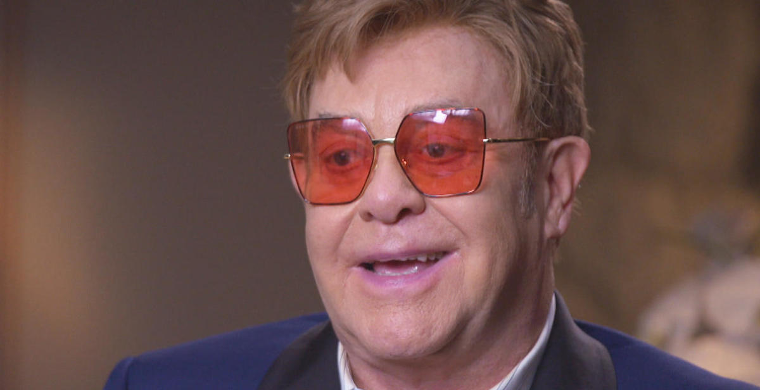Elton John's story reveals why many seek out help
By Dr. Peter May
Church of England Newspaper
August 27, 2020
Elton John's story reveals why many seek out help
In his autobiography, "Me" (Macmillan, 2019),to be published In paperback this autumn Elton John describes vividly the traumas and chaos of his personal life. His story is very relevant to the current debate about "Conversion therapy" in which he plays a significant part.
Born in 1947, his father was a flight lieutenant in the RAF and often away from home. He writes very negatively about him. His father saw emotion as a weakness. He never expressed warmth to his son nor took an interest in what he was doing. In particular, he didn't like his music, never affirmed him or showed that he loved him. As an adult, Elton had little to do with his father and chose not to attend his funeral. His parents had an unhappy marriage and his mother was miserable and bad tempered.
His sexuality was a major cause of his personal distress. In 1967, on his 21st birthday, he got engaged to a girl called Linda. But someone told him that this was a mistake because he was gay. He wasn't at all sure about that, and described himself as being bisexual. The relationship did not progress. Surrounded by gay friends, he loved their company, and two years later he began a homosexual relationship with John, who knew the gay scene well and led him into 'debauchery' (Elton's word).
Yet he still longed to find someone to love, and wondered if a relationship with a woman would be longer lasting than the transient affairs he was now having with men. He
In 1984 he married Renate. Intelligent and beautiful, with a great sense of humour, he saw her as the ideal woman for him. He only has good things to say about her, and couldn't fault her in any way. But the marriage lasted only four years. It ended apparently without ill-feeling.
He doesn't say whether his cocaine and alcohol use were responsible for the divorce, but they were certainly controlling his behaviour. He says he took drugs because he was "broken-hearted". Cocaine and alcohol made him irrational and irresponsible. This expressed itself in rampant promiscuity, sending his private life into chaos. Violence, explosive tempers and attempted suicide were all part of this heady mix. His relationship with John came to an end when John punched him in the face. Another of Elton's former partners, on the day after their relationship broke up, threw himself under a lorry.
Open relationships are a lot more common among gay men than among heterosexual partners, he claims. His endless supply of boyfriends shared strong similarities - good looking, blond, blue eyed and younger than he was. He said he wanted to smother them with fatherly love, the sort of love he never had as a child. He would lavish them with expensive gifts - and then abandon them. He frankly admits he didn't care who they were, as long as they slept with him. But it took its toll. Loneliness became the driving factor. He was desperate to meet some gay men, who weren't attending Alcoholics Anonymous. "I had no idea how to live", he wrote. A friend confronted him with the dreadful truths that he was addicted to drugs, alcohol, food and sex. A counsellor asked him if he wanted to get better. "Yes"' he replied. "I need help. I want to get better." He subsequently spent six weeks in a Rehabilitation Centre. Progress was hard but apparently successful.
Elton John and the current debate
Elton John's story vividly describes the main reasons why people may want help. Here lies a mystery. Elton John is a champion for the current international campaign to ban so-called 'Conversion Therapy.' This term is a serious and deliberate misnomer. It is used to cover all sorts of horrendous therapies used in the past to 'cure' people of homosexuality. Sixty years ago, these included drug therapy, lobotomies and electric shock treatments, all administered by the medical profession. None of them is used today.
Only talking therapies are available now for those who want to move away from homosexual desires, behaviour and culture. These include mental health problems, such as loneliness, anxiety, depression and suicidal thoughts along with promiscuity, drug and alcohol addictions, and violence. Then there is the high risk of sexually transmitted diseases, such a Syphilis, Gonorrhoea, AIDS, Chlamydia, Herpes, Hepatitis B, HPV, along with the various cancers they can cause. Some are motivated to have such counselling by the desire to have children, who are brought up by their own mother and father.
Elton John backs the campaign to make such voluntary counselling illegal. Yet counselling can only be beneficial if the client actively wants it and will co-operate with the counsellor. It cannot be successful, if driven by relatives, employers or friends.
To ban talking-therapies would be a serious infringement of human rights - freedom of speech, freedom of belief, freedom to make one's own choices about therapy. No one is pretending that counselling is a soft option. There are no easy answers or instant cures. But sexual preferences are not fixed by our genes. People do manage to walk away from homosexuality if they are sufficiently determined to do so, and particularly if they also feel some attraction to the opposite sex. Sexual fluidity is a good starting point for counselling therapy. As Elton John found out in the rehabilitation for his other addictions, it can be tough going. But how can he, with any consistency or integrity, obstruct others from seeking such help?
Dr Peter May, Church of England Newspaper, August 27














